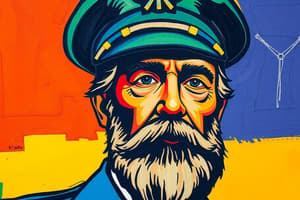Podcast
Questions and Answers
Exult O shores, and ring O bells! But I with mournful tread. Walk the deck my captain lies, Fallen cold and dead. (Analyze with reference to the context)
Exult O shores, and ring O bells! But I with mournful tread. Walk the deck my captain lies, Fallen cold and dead. (Analyze with reference to the context)
These lines are from Walt Whitman's poem "O Captain! My Captain!" It is an elegy for President Abraham Lincoln. The jubilation of the shores and bells suggests a celebration of victory, likely the Union's triumph in the Civil War, but the speaker's "mournful tread" contrasts sharply
Far or forget to me is near; Shadow and sunlight are the same; The vanquished Gods to me appear; and one to me are shame and fame. (Analyze with reference to the context)
Far or forget to me is near; Shadow and sunlight are the same; The vanquished Gods to me appear; and one to me are shame and fame. (Analyze with reference to the context)
These lines suggest a detachment from conventional notions of proximity and distance. This could be interpreted as a state of mind where the physical or temporal distance between objects or events is irrelevant. In Vedantic philosophy, this might be linked to the concept of Brahman, the ultimate reality that permeates everything. Viewing the unity of opposites.
A thought went up my mind today That I have had before But did not finish some way back I could not fix the year. (Analyze with reference to the context)
A thought went up my mind today That I have had before But did not finish some way back I could not fix the year. (Analyze with reference to the context)
These lines reflect a contemplative mood and a sense of introspection about a recurring thought or idea that hasn't yet been fully realized or completed. This kind of reflection is often associated with the process of remembering and revisiting past thoughts or ideas that are significant yet unresolved.
But O heart! heart! heart! O the bleeding drops of red, Where on the deck my captain lies, Fallen cold and dead (Analyze with reference to the context)
But O heart! heart! heart! O the bleeding drops of red, Where on the deck my captain lies, Fallen cold and dead (Analyze with reference to the context)
Write an extended note on the poetic devices used in “O Captain! My Captain!”.
Write an extended note on the poetic devices used in “O Captain! My Captain!”.
Write a critical appreciation of the poem “Because I could not stop for death”.
Write a critical appreciation of the poem “Because I could not stop for death”.
Critically evaluate the poem “Death Sets a Thing Significant”.
Critically evaluate the poem “Death Sets a Thing Significant”.
Discuss major themes as explored in Hemingway's short stories.
Discuss major themes as explored in Hemingway's short stories.
Give a critical justification with respect to the title of the play All My Sons.
Give a critical justification with respect to the title of the play All My Sons.
Write a critical comment on the genre of The Scarlet Letter.
Write a critical comment on the genre of The Scarlet Letter.
Discuss the poetic achievements of Walt Whitman with suitable examples from the poems prescribed in the course.
Discuss the poetic achievements of Walt Whitman with suitable examples from the poems prescribed in the course.
Write a detailed note on the rise and development of American Drama.
Write a detailed note on the rise and development of American Drama.
Flashcards
Ship in "O Captain! My Captain!"
Ship in "O Captain! My Captain!"
Symbolizes the nation's struggle and eventual victory in the Civil War.
Captain in "O Captain! My Captain!"
Captain in "O Captain! My Captain!"
Represents Abraham Lincoln, the leader guiding the nation through turmoil.
Port in "O Captain! My Captain!"
Port in "O Captain! My Captain!"
Represents the end of the Civil War and the start of a new era for the nation.
Death-angel in "O Captain! My Captain!"
Death-angel in "O Captain! My Captain!"
Signup and view all the flashcards
"Because I could not stop for Death": Central Conceit
"Because I could not stop for Death": Central Conceit
Signup and view all the flashcards
"Because I could not stop for Death": Setting Sun
"Because I could not stop for Death": Setting Sun
Signup and view all the flashcards
"Because I could not stop for Death": The School
"Because I could not stop for Death": The School
Signup and view all the flashcards
"Death Sets a Thing Significant": Theme Meaning
"Death Sets a Thing Significant": Theme Meaning
Signup and view all the flashcards
Hemingway's Short Stories: Prominent Themes
Hemingway's Short Stories: Prominent Themes
Signup and view all the flashcards
Hemingway's Short Stories: Masculinity Themes
Hemingway's Short Stories: Masculinity Themes
Signup and view all the flashcards
"All My Sons": title means?
"All My Sons": title means?
Signup and view all the flashcards
"All My Sons": theme meaning
"All My Sons": theme meaning
Signup and view all the flashcards
"The Scarlet Letter": novel theme meaning
"The Scarlet Letter": novel theme meaning
Signup and view all the flashcards
"The Scarlet Letter": portrayal of Native Americans
"The Scarlet Letter": portrayal of Native Americans
Signup and view all the flashcards
Walt Whitman: achievements
Walt Whitman: achievements
Signup and view all the flashcards
Walt Whitman: free verse?
Walt Whitman: free verse?
Signup and view all the flashcards
American Drama: Early Years
American Drama: Early Years
Signup and view all the flashcards
Melodrama: description
Melodrama: description
Signup and view all the flashcards
American Drama: 20th Century
American Drama: 20th Century
Signup and view all the flashcards
Eugene O'Neill: themes
Eugene O'Neill: themes
Signup and view all the flashcards
Study Notes
- These notes are covering American Literature answering provided questions
"O Captain! My Captain!" Analysis (Context i & iv)
- Walt Whitman's "O Captain! My Captain!" is an elegy for President Abraham Lincoln, using the metaphor of a ship and captain
- The poem's beginning contrasts celebration with the speaker's mourning
- Imagery emphasizes Lincoln's assassination and the nation's grief
- The metaphor suggests the nation has lost its guiding light
- Despite despair, the poem offers hope, suggesting the nation will strive for progress
- The poem honors leadership, loss, and Lincoln's legacy
Poem Interpretation (Context ii)
- Poem advocates philosophical viewpoint transcending time and space
- "Far or forget to me is near" detaches from proximity notions, linking to Brahman
- "Shadow and sunlight are the same" implies interconnectedness, related to Indian philosophy's duality
- "The vanquished Gods to me appear" recognizes divine presence, aligning with immanence
- "and one to me are shame and fame" detaches from worldly concerns, reflecting Buddhist non-attachment
- Poem emphasizes interconnectedness of all things, illusory duality, and detaching from worldly concerns
Recurring Thought (Context iii)
- Lines reflect introspection about unrealized thought
- Reference to not being able to "fix the year" indicates temporality challenge
Extended Note on Poetic Devices in "O Captain! My Captain!"
- Metaphor: Ship and captain represent the nation and Lincoln, symbolizing Civil War struggles/victory
- Personification: Ship given human qualities, creating empathy for nation's struggles
- Symbolism: "Ship" symbolizes the nation, "captain" represents Lincoln, "port" signifies war's end/new era, "death-angel" symbolizes Lincoln's assassination
Critical Appreciation of "Because I could not stop for Death"
- Poem explores mortality through personification of Death as a gentleman
- Speaker is taken on carriage ride- metaphor for passage into afterlife
- Imagery: "Houses that seemed a swelling of the ground" symbolize descent into earth
- "Narrow way" symbolizes the constricting nature of death
- "Setting sun" foreshadows the end
- "School" represents unfinished education, "fields of gazing grain" symbolize cyclical nature
Critical Evaluation of "Death Sets a Thing Significant"
- Consider vividness/effectiveness and emotional response of the imagery
- Examine metaphors, similes, and other figurative devices
- Analyze alliteration, assonance, rhyme, and rhythm
- Identify the poem's form
- Analyze arrangement of ideas and progression of poem's narrative
- What is the main message or theme that the poet conveys?
- Are there any significant symbols or motifs present in the poem?
Major Themes in Hemingway's Short Stories
- Masculinity: Protagonists struggle with courage, honor, stoicism, facing limitations and vulnerabilities
- Search for Meaning: Characters adrift, seeking solace but finding it elusive, suggesting lifelong journey
- Disillusionment: Characters experience loss of innocence and disillusionment resulting from various factors; explores psychological consequences through prose
Critical Justification of "All My Sons" Title
- Joe Keller's actions caused pilots' deaths, title references Keller's belief actions were for family's well-being
- "All my sons" can be metaphor for young men who died from defective parts
- Chris Keller torn between loyalty to father and moral convictions, title reflects internal conflict
- Ann Deever reminds of Keller's crimes, title references Ann's loss of father and security
- Arthur Miller explores American Dream and moral compromises; the title serves as reminder of cost of ambition
Critical Comment on the Genre of The Scarlet Letter
- Hester Prynne endures public shame but emerges strong, strength tied to suffering
- Novel's focus on Hester's sexual transgression reinforces patriarchal norms
- Native Americans stereotyped as savage/superstitious, reinforcing Puritans' cultural superiority
- Novel reinforces traditional gender roles, tying Hester's redemption to conformity
Poetic Achievements of Walt Whitman
- Pioneering Use of Free Verse: Rejecting rhyme/meter, Whitman employed prose style capturing thought flow, expressing ideas with spontaneity
- Celebration of Democratic Ideals: Celebrates diversity/equality, evident in praising individuals from all walks of life
- Embracing Body/Sexuality: Challenging norms, Whitman openly acknowledged erotic aspects, earning criticism
Rise and Development of American Drama
- Early American Drama: Complex of Puritanical values/European traditions, performances banned/restricted, religious pageants emerged
- 18th Century: Attitudes shifted, touring companies introduced styles
- William Dunlap began original plays
- 19th Century: Genre characterized by exaggerated emotions/sensational plots
- 20th Century: Golden Age for American drama due to exploration of complex themes/challenging conventions
- Tennessee Williams focused on marginalized characters and their struggles
- Arthur Miller dealt with social/political issues of power etc
Studying That Suits You
Use AI to generate personalized quizzes and flashcards to suit your learning preferences.




